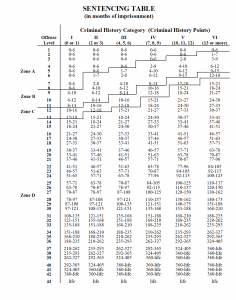Safety Valve Federal Sentencing And Drug Charges
Posted by David C. Hardy on July 14, 2019

Federal law sets out the requirements for the safety valve.
What is a federal minimum mandatory drug sentence?
Defendants in the Tampa federal courts with federal drug charges frequently face minimum mandatory sentences. A minimum mandatory sentence is a minimum sentence that the judge must impose by law, whether the judge likes it or not.
For example, if a Tampa federal drug case involves at least 100 kilograms of marijuana, under federal law there is a 5-year minimum mandatory sentence. That means that if a defendant pleads guilty to a Tampa federal criminal drug case involving 100 kilograms of marijuana, the judge would have to sentence that defendant to at least 5 years in prison. Another example involves federal cocaine charges. If a defendant pleads guilty to a Tampa federal criminal drug charge involving 5 kilograms or more of cocaine, the judge would have to sentence the defendant to at least 10 years in prison.

The safety valve can protect low level members of a federal drug conspiracy from long minimum mandatory prison sentences.
What is the Safety Valve and How Can it Help a Person Accused of a Federal Drug Trafficking Charge?
One of the ways around a federal drug trafficking minimum mandatory prison sentence is called the safety valve. The safety valve can be found in federal law 18 U.S.C. 3553(f), as well as section 5C1.2 of the United States Sentencing Guidelines. In 2018, a law called the First Step Act made it easier for defendants to qualify for the safety valve.
The idea behind the safety valve is that the law should not punish low-level drug offenders that have little or no criminal history the same way that it punishes the leaders and organizers of drug trafficking organizations. So, the safety valve’s purpose is to provide a way around federal minimum mandatory sentences in drug trafficking cases for low-level drug offenders. Perhaps, a better name for the safety valve would have been “the escape hatch”, because the safety valve is essentially a way for some defendants to escape a federal drug trafficking minimum mandatory sentence.
One of the best ways a Tampa federal criminal defense attorney can help a client facing a federal drug charge is to ensure that if the client qualifies for the safety valve, that the judge applies it at the client’s sentencing hearing. That’s because the safety valve can make a big difference with respect to the amount of time a person spends in prison for a federal drug trafficking charge.
What are the 5 Conditions that a Defendant accused of a Federal Drug Trafficking Crime Must Meet to Qualify for the Safety Valve?
There are 5 conditions that a defendant accused of federal drug trafficking crime must meet before the safety valve will apply.
The first condition deals with a defendant’s criminal history. Certain types of criminal history will make a Defendant ineligible for the safety valve. For example, if a defendant has a prior criminal conviction for which they spent more than 13 months in prison, and the arrest in their current case is within 15 years of their prison release date, then the safety valve will not apply. Also, if a defendant has a prior conviction for a violent offense for which they spent 60 days or more in jail, and the arrest in their current case is within 10 years of their jail release date, then the safety valve will not apply. The defendant did not use violence or credible threats of violence or possess a firearm or other dangerous weapon in connection with the offense. The offense did not result in death or serious bodily injury to any person. The defendant was not an organizer, leader, manager or supervisor of others, or engaged in a continuing criminal enterprise. The defendant has, by the time of sentencing, truthfully provided to the Government all relevant information concerning the offense.
What are the Benefits for a Defendant if the Safety Valve Does Apply?

Federal District Court Judges must take into consideration The United States Sentencing Guidelines when sentencing a defendant.
If a defendant does qualify for the safety valve, then a federal district court judge can impose a sentence less than the minimum mandatory, including probation. Another benefit of the safety valve is that it also allows for a 2 level reduction in a defendant’s federal sentencing guideline offense level. In some cases, that two level reduction can lower a defendant’s recommended guideline prison sentence by several years.
Are you looking for the best Tampa federal criminal defense lawyer?

Attorney Hardy began his work in the federal courts when he served as an intern with the United States Department of Justice in 1999.
If the federal government has accused you or a loved one of a federal criminal drug offense, your best option is to hire an experienced Tampa federal criminal defense attorney to represent you.
Tampa criminal defense attorney David C. Hardy is a former prosecutor that now represents persons accused of Tampa federal drug crimes. He is Board Certified by the Florida Bar and the National Board of Trial Advocacy as an Expert in Criminal Trial Law. He has extensive experience handling federal criminal drug cases. Contact Tampa federal criminal defense attorney David C. Hardy and get help today.
Posted in Federal Criminal Defense

David C. Hardy
David C. Hardy is a criminal defense attorney with offices in Tampa, Florida. He is a former prosecutor that is Board Certified by the Florida Bar and The National Board of Trial advocacy as an expert in criminal trial law. He practices in the areas of federal criminal defense, Florida criminal defense, and Florida DUI defense.
